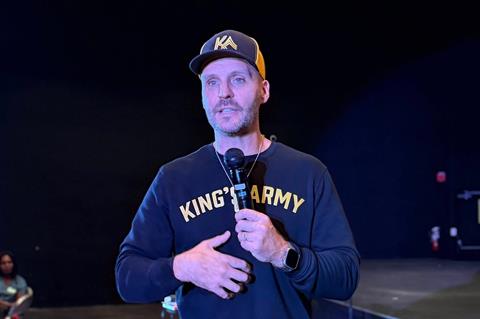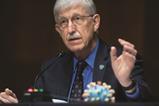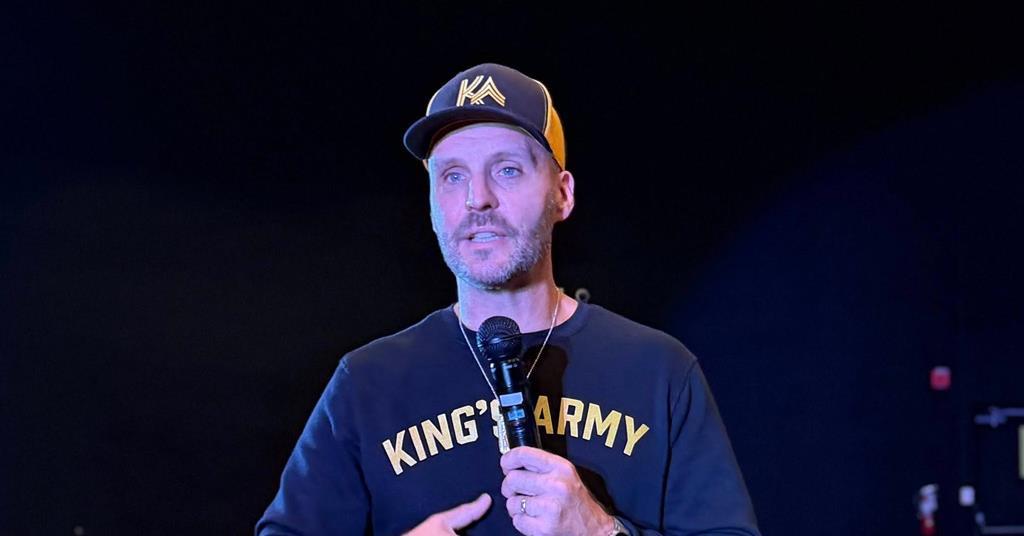Premier Christianity uses cookies Read our cookie policy.
By 2025-10-31T14:07:00+00:00
Scott Macnamara’s King’s Army hit headlines after marching through Soho shouting ‘Jesus saves’. He tells Premier Christianity why he believes the Church needs to recover a biblical understanding of spiritual warfare and responds to claims his group targets the LGBT community
A cult-like group dressed in black uniforms take to the streets of London’s LGBT district. They shout loud chants and slogans with a spiritual edge. Passers by feel threatened and intimidated. When the video of the moment goes viral online (thanks to Charlie Kirk’s Turning Point USA sharing it positively) secular media outlets take notice. It fits a narrative. King’s Army must be a homophobic, far right hate group aligned with Christian Nationalism.
That’s one perspective, anyway.
But what’s the other side of the story?
Activists from the ‘King’s Army’ block traffic in Soho in protest of the immoral culture in the ‘sex district’. pic.twitter.com/sVHN0F1qSW
Days after The Metro ran their headline, ‘A homophobic march took over London’s gay district – I no longer feel safe’, King’s Army got in touch, offering Premier Christianity an “exclusive interview” in order to clear up what they say are misunderstandings about their group’s activities.
It wouldn’t be the first time that secular media has got the wrong end of the stick when it comes to reporting on Christian ministries. On the other hand, King’s Army tactics are viewed with suspicion and concern – even within some parts of the UK Church.
Is militaristic language and symbolism really a good way of spreading the gospel in 21st century Britain? Doesn’t it send the wrong message? Nearly 20 years after Christian youth charity Crusaders rebranded themselves as Urban Saints, returning to talk of crusades, war and fighting (even in a spiritual sense) feels misguided to many.
In speaking to the group’s founder, I discovered that Scott McNamara himself hasn’t always been fully convinced of the decision to brand his Christian group as an “army”.
So why do it? That’s easy. God told him to. And this loyal footsoldier serves refuses to contradict his commanding officer.
Scott, your group has hit the headlines recently. What is the King’s Army and what do you stand for?
King’s Army was set up in September 2022 after I had a word from the Holy Spirit. The Lord showed me that he was going to raise up an army for the end times to push back darkness. He actually told me to call it the King’s Army.
It was formed out of Jesus at the door, which is an evangelistic presentation that has gone around the world. It’s a very simple one-to-one evangelistic resource. Charlie Mackesy illustrated the image, and the nine phrases were birthed on the streets of Northern Ireland when I worked as a street evangelist.
The Lord showed me that the gospel is one of our weapons in this spiritual war. But the weapon is only as good as the hands holding it. It takes a soldier to win a war. You could put a weapon in the hand of a civilian, but they won’t be able to win a war. The King’s Army is soldier-training.
We read in 2 Timothy 2:3-4 “Suffer as a good soldier of Christ Jesus. No soldier gets entangled in civilian affairs, but rather tries to please his commanding officer.”
So I believe that the King’s Army is a way that we can raise up soldiers of Christ who know how to go the distance. We’re trying to raise the standard from civilian evangelism to soldier evangelism. And I believe we’re suffering from a civilian Christianity, which is about me, myself, and I.
The Kings army is saying: Is there anyone else out there who’s willing to give a bit more that we could see greater fruit and greater breakthrough?
So you didn’t think there were any other Christian groups that were pursuing that level of excellence in evangelism. Is that right?
Yeah. I mean, there are great evangelistic ministries and movements, of course. But I’m talking about a group of individuals who are in the trenches. I’m talking about people who know what it is to get their hands dirty, their boots dirty, to go behind enemy lines and really fight.
The SAS were formed in the second world war as a special force who could thrive behind enemy lines. That’s the vision of King’s Army – not to discount others and what they’re doing, but just to say, I believe that we need a group of evangelists who know what it is to go behind enemy lines and take back what was stolen.
I don’t think anyone else is doing this with a militant mindset. The last people who did it were the Salvation Army 150 years ago – red hot evangelists who went into the darkest parts of the world armed with the gospel. The Salvation Army were in 133 nations – they shook the world through a gospel-led, soul-winning discipleship movement. Obviously it changed over the years and became more about social justice. I really felt like the Lord wanted me to pick up that mantle and run with that again.
King’s Army was recently in the national news because a video emerged of you marching through Soho in London and shouting ‘Jesus Saves!’. Why were you there and what happened?
We are a one-to-one ministry. [The evangelism tract] Jesus at the door is the weapon in the hand of the soldier. So we go one-to-one and share the gospel.
Now, before we do that, we believe in taking territory in terms of the spiritual realm. We’ve got to win the war in the skies before we win the war on the ground. So we march into that area and we make some declarations. We speak some truths into the spiritual atmosphere, declaring that Jesus is King.
We have a phrase “Basileus Basileōn” which is “King of Kings” in Greek. We’re not shouting at people. We’re not talking to lost people. We’re talking to the principalities and powers in the heavenly realms, according to Ephesians 6. We worship, we pray, and then we go into the enemy’s camp, behind enemy lines, and take back what he stole from us.
I know many Christians who would support your one-to-one evangelism, but wouldn’t understand why you’re shouting into the air in the middle of Soho beforehand. Where in the Bible do we see the disciples doing that kind of thing?
Ultimately I would go to Ephesians 6:11-12 where we read about a spiritual war that we’re in, and the armour of God. ”For our struggle is not against flesh and blood, but against the rulers, against the authorities, against the powers of this dark world and against the spiritual forces of evil in the heavenly realms. herefore put on the full armour of God, so that when the day of evil comes, you may be able to stand your ground”.
You could look at the metaphor Paul is using, and say he doesn’t mean to do it physically, which obviously, I’m sure he doesn’t – but he was using something to drive the point home that we are in a spiritual war. I mean, most Christians believe in spiritual warfare. They believe in in strongholds. They believe in the prayer closet. Do we not bind the strong man in the prayer closet? That’s biblical. I’m not sure anyone would have a problem with that. Is there any difference between binding the strong man in the prayer closet or doing it on the street in the enemy’s camp?
Many believers have no problem interceding from a safe church building, but we also should intercede from behind the enemy’s camp too. And that’s how we do it. I’m asking the Lord to silence the demonic stronghold over the area, while we’re going in to rescue the lost.
Have you noticed these declarations make a tangible difference to the spiritual atmosphere? Is the one-to-one evangelism easier if you spend a few minutes shouting ‘Jesus saves’ beforehand?
Yes. We went into Kilburn and stood there in this formation. While we were praying, we began to make a couple of declarations. “Basileus basileōn, King of Kings.” As we did that, I kid you not, there was a noise. It was like a shockwave. A number of people heard it. It was described like a crack in the Spirit. It was really supernatural.
All we did was stand there in what happens to be, obviously, a Muslim stronghold area. I’m not saying that’s why it happened, but I believe it was behind enemy lines. Off the back of that, King’s Army was launched. For me, it was the Lord saying: “Look, not everybody’s going to get this. But there’s power in the unseen world.”
Why did you decide to do your declarations and evangelism in Soho specifically?
Some people were saying we were targeting the LGBT community. But it was nothing like that at all. We’ve done these gatherings in all different parts of London. We honestly believe that there are places everywhere where the enemy has a stronghold.
But you have spoken to be about “going behind enemy lines.” So to be clear – you weren’t going to Soho because you thought there was an “LGBT stronghold”?
No, not at all. I mean, it’s got a stronghold as much as any area of London. Wherever there’s people who are lost, and bound by sin and Satan, we’re going to see that kind of territory. It wasn’t that we thought: Right, there’s gay people. Let’s target them. Not in any way. That was definitely misconstrued.
But do you accept that a person who identifies as LGBT walking through Soho that night is likely to feel threatened by a group of people who are wearing uniform and shouting loudly in the street? Even if you’re shouting “Jesus!”, dressing as a Christian army could be seen by offensive and antagonistic – especially by a community who have experienced a lot of hate from people claiming to be Christians.
I think, honestly, whatever you do, people are going to be offended. The gospel is an offense to those that are perishing.
You could do it in the perfect textbook way and there would be peoplewho would have got offended because they don’t want Christians in that area. But if people stuck around, which they did, then as soon as we disperse, we’re praying for people outside gay bars, hugging people, loving on people and sharing the gospel. People are responding to Christ.
One gentleman was very angry. He was shouting at us and then, within about five minutes, he was hugging our team – because he began to see we weren’t there from a stance of hate, but only love.
We definitely weren’t looking to cause any offense. But I’ve been doing this long enough to know that you can’t please everybody. But also, these declarations were such a short moment – we’re probably talking about five minutes, compared to the majority of time that was spent one-to-one, loving people.
It isn’t surprising to me that the media picked up on the declarations. Stopping the traffic and loudly shouting into the air while dressed as an army is obviously more newsworthy than quiet one-to-one evangelism. Were you surprised by the media attention?
To be honest, I was very surprised. I was the one who filmed the video clip which then went viral. If I thought that it would get the reaction it did, I probably would have filmed nothing, or more of a balance of what we did. I had no idea that it was going to get shared by Turning Point, and then explode.
I guess the only thing I would expect, especially from seasoned and professional journalists, is that they would at least ask the question before making a very strong argument. Why not ask, “Hey guys, what were you doing there?” It wouldn’t take very much at all to find out, like I’ve explained to you.
How did journalists approach you and cover the story?
The Sunday Times contacted us immediately, and said: “Would you do like a podcast or live radio interview?” We asked a few questions. They said: “There’s no agenda. There’s no angle.” So I came on, and immediately they were saying: “Are you guys anti LGBT? Are you homophobic?” And I was trying to explain: “No, we’re not doing that.” So they said: “You’ve got black uniforms.” And I was explaining, well, actually, there’s a lot of gold in these uniforms too. I still don’t know why black is synonymous with some sort of cult…
I tried to get our point across. Then some other publications reached out. A very well known newspaper asked me for a long interview, and asked about 15 questions. I took time to answer those questions in the best manner that I could. But not one was used. Maybe my response wasn’t exciting enough, or it didn’t align with the narrative that they wanted to portray. That was disappointing for me, because I’m a very honest person. We’re not trying to hide anything. We were there just to show the love of Christ.
If you could go back in time, would you still post the video online?
Posting that moment with no context probably wasn’t the wisest thing to do, because people can’t understand what we were trying to do.
We’ve definitely looked at some of these things and said: “Right, let’s fix this for next time, because we don’t want to give an inaccurate representation of who we are.”
I’m sure plenty of Christian leaders admire the Jesus at the door evangelistic tracts. But has it been more difficult to convince them it’s a good idea to put on uniform and present yourself as an army?
For some, for sure.
In March, we did a four day training school in London with almost 250 people. I was actually resisting the military concept of King’s Army. People weren’t getting it, and it knocked my confidence. So I thouhgt: I’m just going to drop it. But when I got up to train, it was as if the Lord was not giving me permission to drop it. The Lord was saying: “I want you to stand on the conviction of what I’ve shown you,” and I believe this is a heavenly vision.
Are you aligned with Christian Nationalism?
We’re not a political movement.
We’re a gospel-led movement, so we don’t get caught up in politics. Obviously, individuals within King’s Army have their stance and their beliefs, but as a movement, I believe we’re right down the middle. We’re trying to win people with the gospel from both the left and right.
I know there’s a lot of tension even within the Church right now on this question and the various things going on. When I’m asked about this, ultimately my response is, “I believe in freedom, and I believe in fighting for freedom. I believe the gospel is a fight for freedom. So whenever people are fighting for freedom, I believe that’s a good thing.” I’ll leave it at that, and people can interpret that as they desire.
The New Testament describes the church as family, a temple, a bride, a body, a flock etc. If the Church has been guilty of ignoring the other analogy which is used – an army being at war – what are the consequences? What do we lose through minimising militaristic language?
The heritage that we have in Christendom was of blood and sacrifice. Go back and look at how our forefathers were fed to the lions, lit on fire like Roman candles and burned at the stake. I feel that now we’re in a position where we just want a nice time. We want a nice worship set with three songs. Don’t go too long, don’t go too short, make sure it’s not too loud. I want nice coffee and doughnuts. We’ve created this culture where it’s about what I get.
A friend of mine who’s part of King’s Army sent me something from Tikkun global, which is a Messianic Jewish movement. He said, “The Jews were looking for the commander and missed the lamb. The Church is looking for the lamb and can miss the commander.”
I thought that was a very profound statement. 


Grab this Deal!
We’re celebrating a remarkable journey from our humble beginnings as Buzz in the 1960s to the vibrant, multi-platform publication we are today. One thing has remained constant: our commitment to connecting faith with the world around us. To celebrate our birthday, we are offering you a Print and Digital subscription for just £24 your first 12 months!
Subscribe Today
*Offer applies in UK only, but check here for our overseas offers
2025-09-30T16:08:00Z
The Unite the Kingdom protest exposed a dangerous fusion of Christian imagery and far‑right ideology, argues Guy Hewitt. The Church must urgently reclaim its message of love and justice, he says
2025-09-03T08:29:00Z
Is the sudden hoisting of England flags a positive sign of patriotism, or a dangerous endorsement of hateful views? Danny Webster explores the issues
2025-07-10T11:12:00Z
The leader of Emmanuel Church, Lurgan and 24-7 Prayer Ireland speaks to Emma Fowle about why the Church needs a wholesale rethink when it comes to leadership models, leading through grief and why the Apostle Paul would turn tables in many Christian conference green rooms
2025-10-28T16:29:00Z
Dr Beth Allison Barr’s academic research brought her into conflict with the teaching of the church she grew up in. In this interview, she explains why she believes the prohibition of female church leaders is a modern phenomenon, not a biblical mandate
2025-10-22T15:23:00Z
Dr Francis Collins was at the forefront of the fight against Covid-19 and believes his team’s record-breaking development of vaccines was an answer to prayer. But not all Christians agreed, and he quickly found himself being targeted by some US evangelicals and conspiracy theorists. He tells Sam Hailes how faith sustained him – and why truth matters in a politically divided age
2025-10-22T13:44:00Z
The Finnish MP is facing jail for a social media post that challenged her church’s support of gay Pride. Yet her joy – and determination to use every opportunity to share the gospel – is heaping coals on those who persecute her
Site powered by Webvision Cloud

